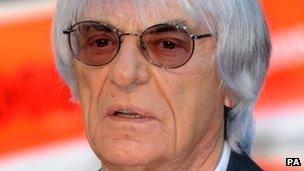F1 chief Bernie Ecclestone made 'corrupt agreement'
- Published

Bernie Ecclestone is scheduled to appear as a witness at the High Court next week
Formula 1 boss Bernie Ecclestone made a "corrupt agreement" in an attempt to stay in charge of the sport, it has been claimed at the High Court.
Mr Justice Newey was told Mr Ecclestone deliberately undervalued the Formula 1 Group during its sale in 2006.
German media company Constantin Medien claims it lost out over the deal and is seeking about £90m in damages.
The F1 chief executive denies any wrongdoing and his lawyers say the claim lacks "merit".
Retained position
Philip Marshall QC, representing Constantin, outlined its allegations at the start of a High Court trial in London expected to last several weeks.
He said a banker had "assisted" Mr Ecclestone to facilitate the sale of the Formula 1 Group to a "purchaser chosen by Mr Ecclestone".
Mr Marshall suggested that "corrupt payments" had resulted in a sale of the bank's investment in a group of companies that owned "lucrative commercial rights" associated with Formula 1 racing.
He said payments totalling about £27m had been made to Gerhard Gribkowsky, who had been a "senior ranking official" at a German bank, at the instigation of Mr Ecclestone.
Mr Marshall told the court a "corrupt arrangement" was entered into between Mr Ecclestone and Dr Gribkowsky in 2005.
He said Mr Ecclestone had benefited financially and he said the deal had allowed Mr Ecclestone to retain a "position with Formula 1 going forward".
There had been a "real risk" of Mr Ecclestone's removal from his position in the Formula 1 Group, he added.
'Central issues'
Mr Marshall said the German bank sold its "holding" within the Formula 1 Group to a private equity group called CVC.
He said Mr Ecclestone thought CVC would support his "continuing role as chief executive" of operating companies within the Formula 1 Group.
Mr Marshall said Constantin had investment rights in the Formula 1 Group and was entitled to proceeds of any sale.
He said the bank's investment had been sold "without the normal and proper process" and Constantin had lost out.
Mr Marshall said: "The central issues are, firstly, over whether these payments were corrupt and, secondly, over whether they resulted in a sale of the investment of (the German bank) in a group of companies owning the lucrative commercial rights associated with Formula 1 motor racing at a significant undervalue."
He suggested that if the judge ruled in favour of Constantin on those issues, then the company would have been a "victim of fraud" and entitled to compensation.
Mr Marshall said in court that Mr Gribkowsky had been given a jail term of more than eight years after being convicted of corruption at a trial in Munich in 2012.
'Lacks merit'
Lawyers representing Mr Ecclestone have outlined their case to the judge in written arguments.
Robert Miles QC, representing Mr Ecclestone, said: "This claim lacks any merit. In short, this is an artificial, manufactured, complaint."
He added: "The claim fails on each of its elements. There was no conspiracy, there was no intent to injure Constantin. Constantin has suffered no loss."
Mr Miles said it had been arranged in 2006 that Dr Gribkowsky would be given a "consultancy package" and Mr Ecclestone received "tax threats".
"It was arranged that Dr Gribkowsky would be given a pay off by way of consultancy package as he was requesting," he said.
"Mr Ecclestone agreed to a pay off because of the tax threats and insinuations which he had received from Dr Gribkowsky."
Mr Ecclestone was not in court, but is scheduled to appear as a witness next week. The hearing continues.